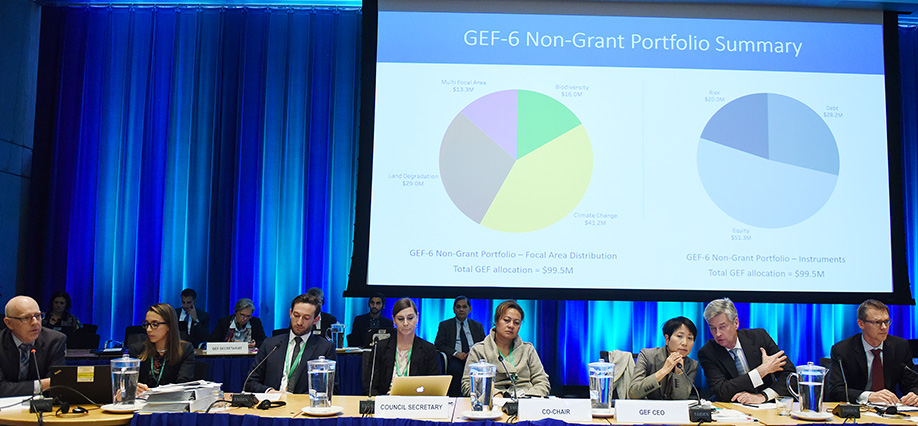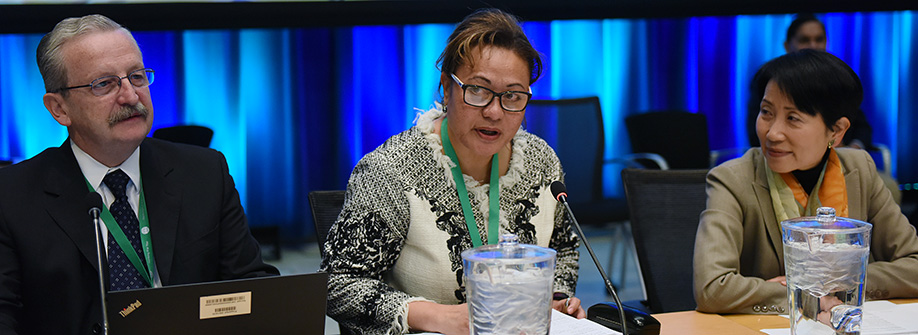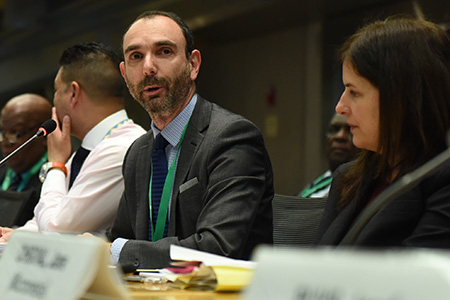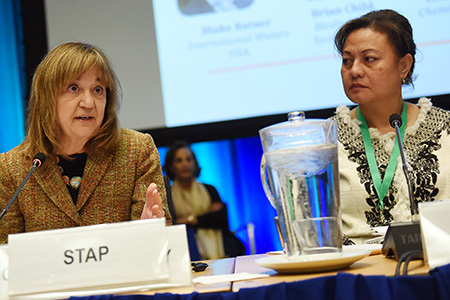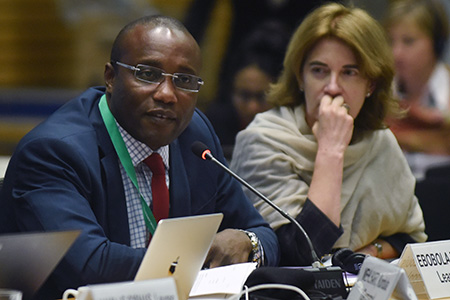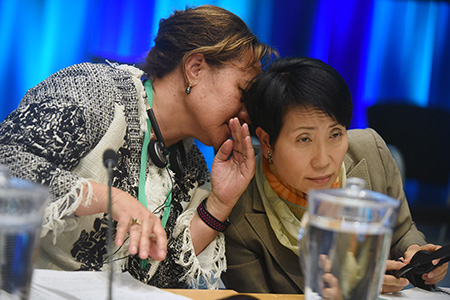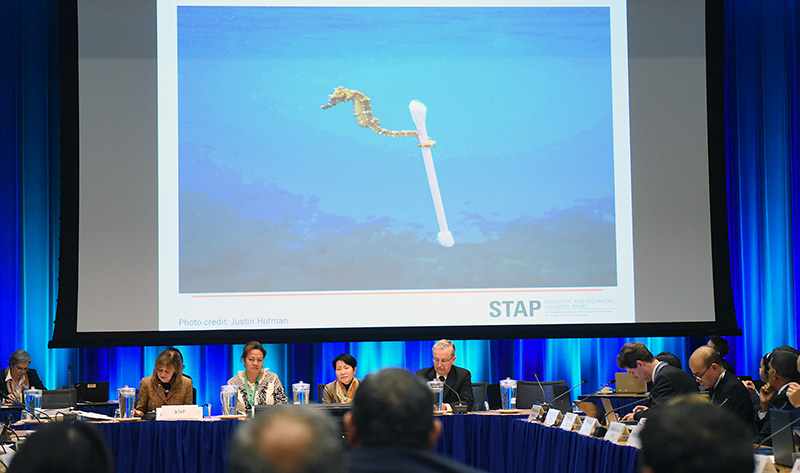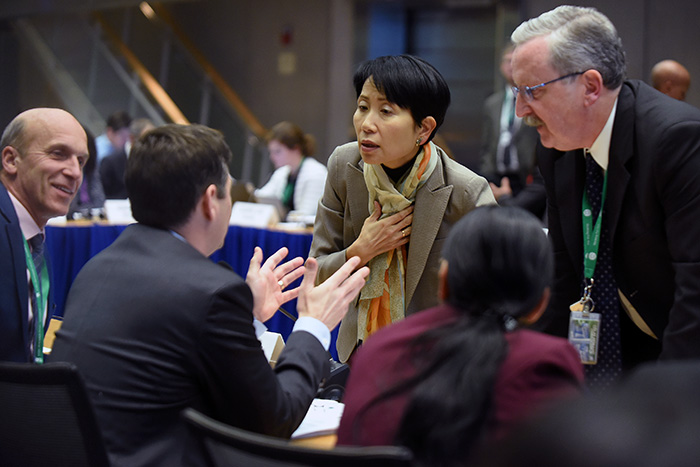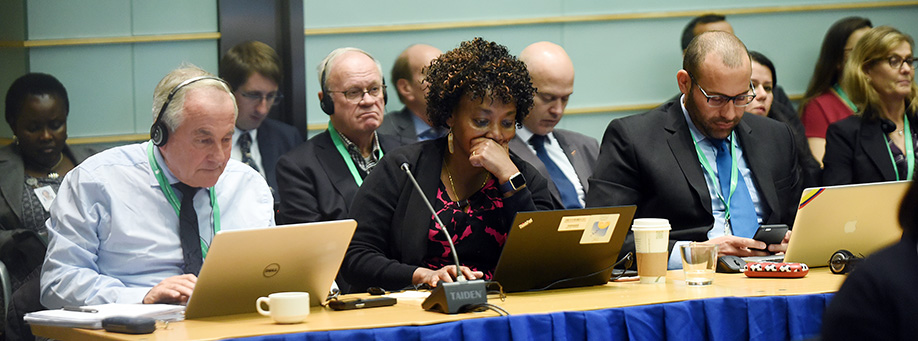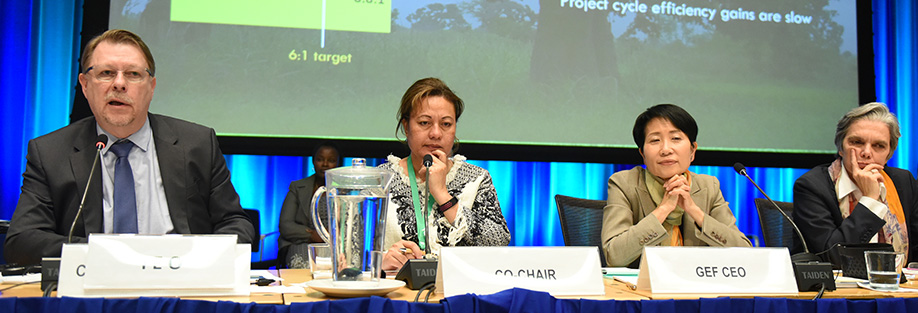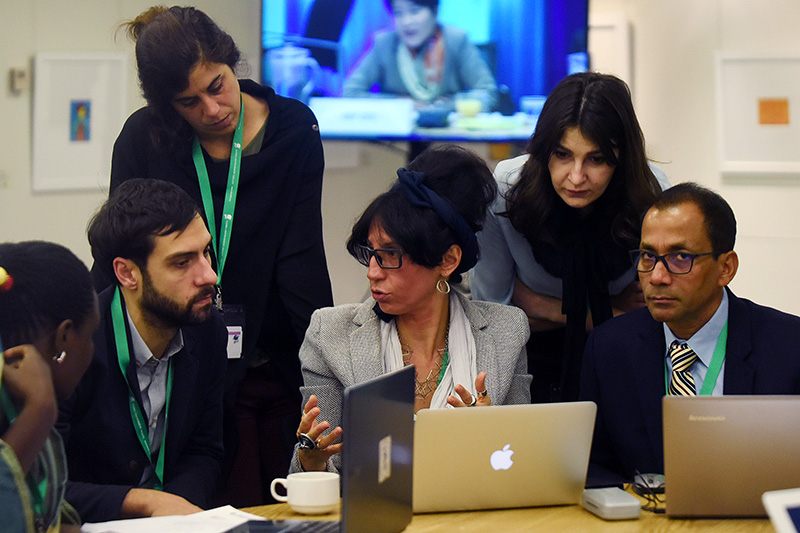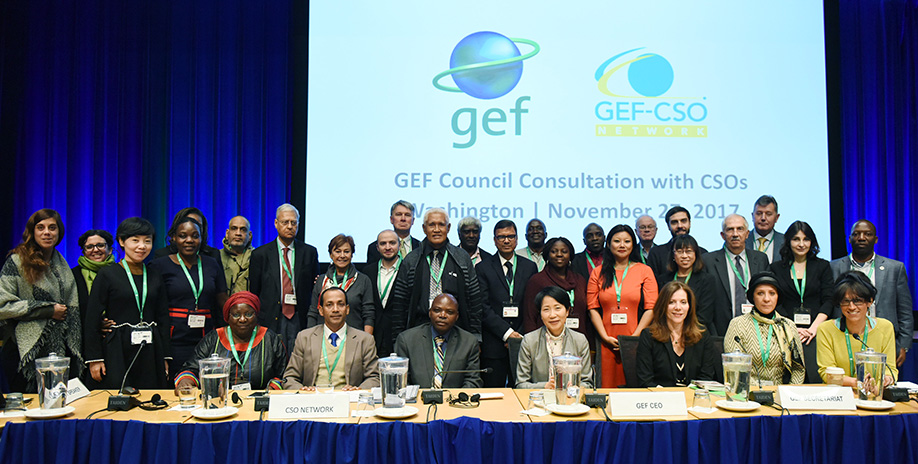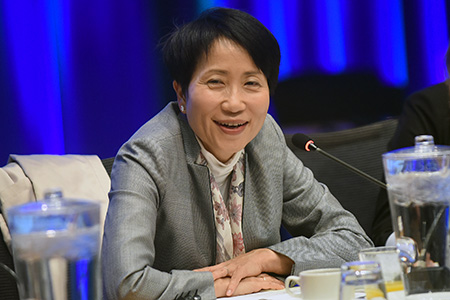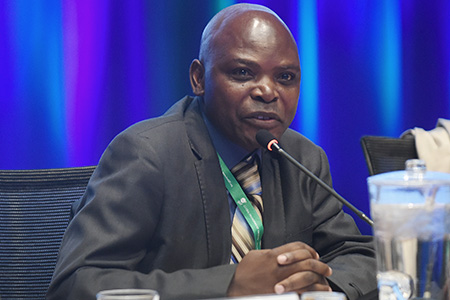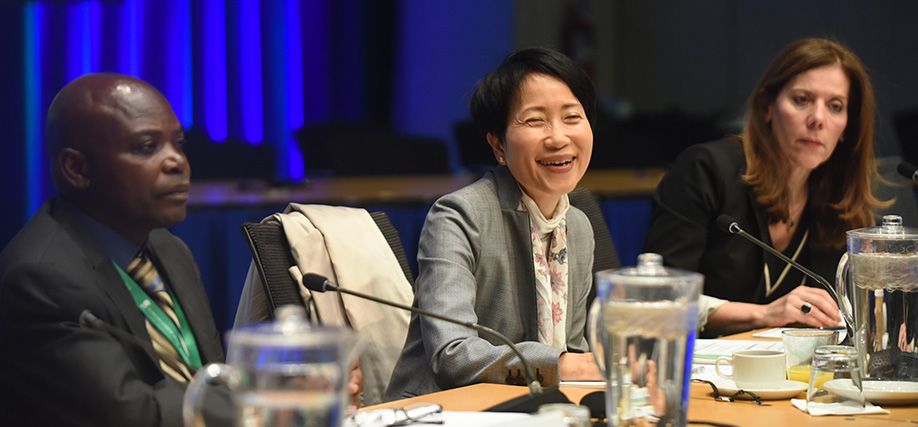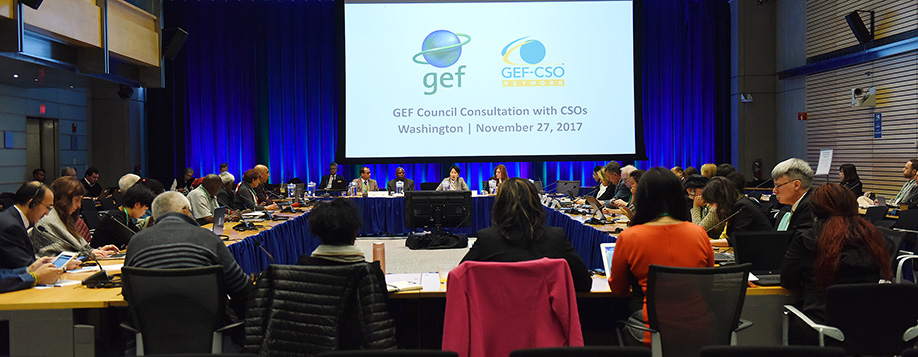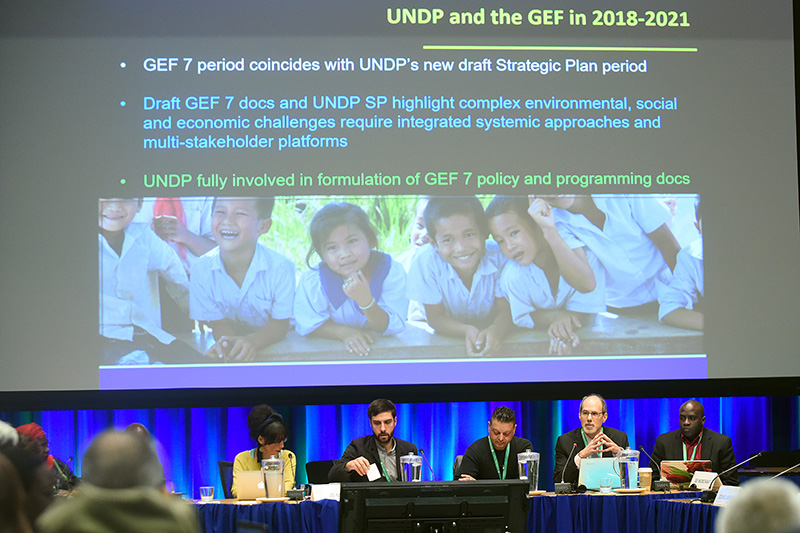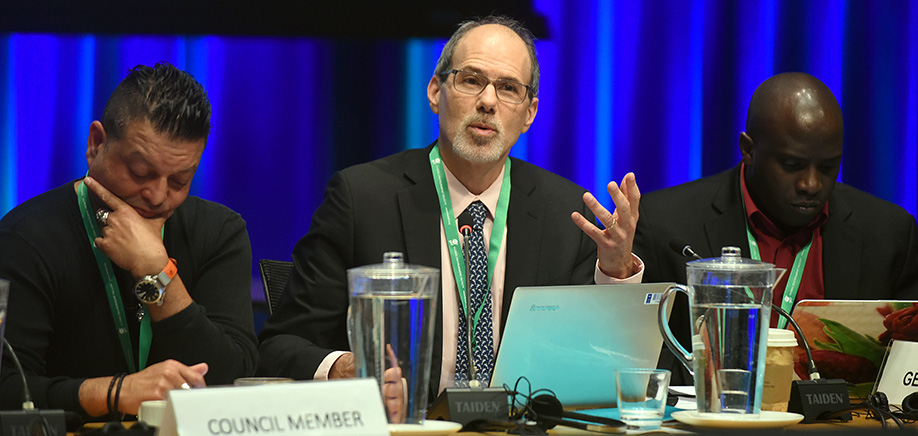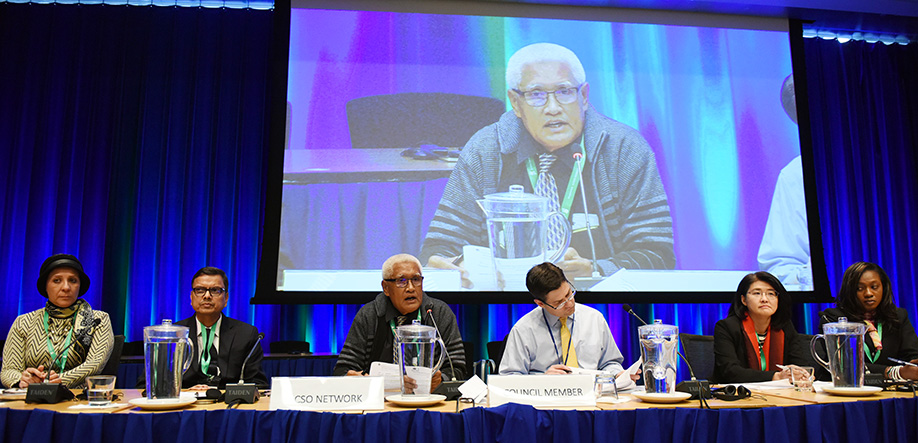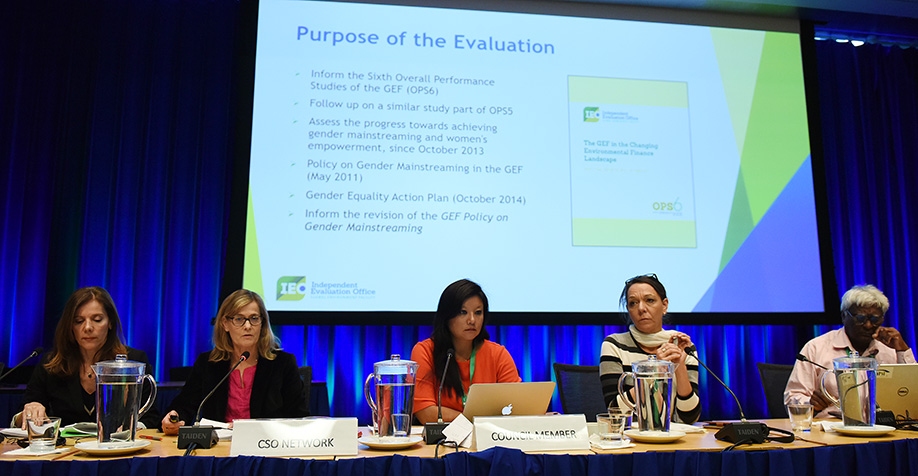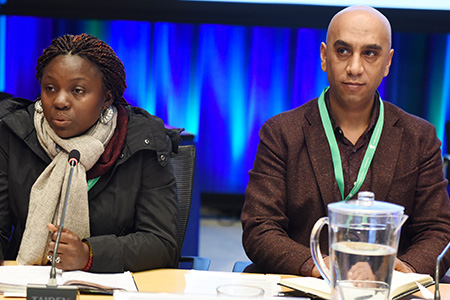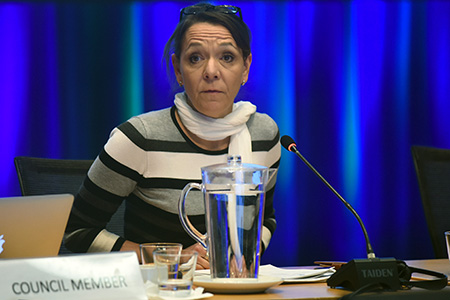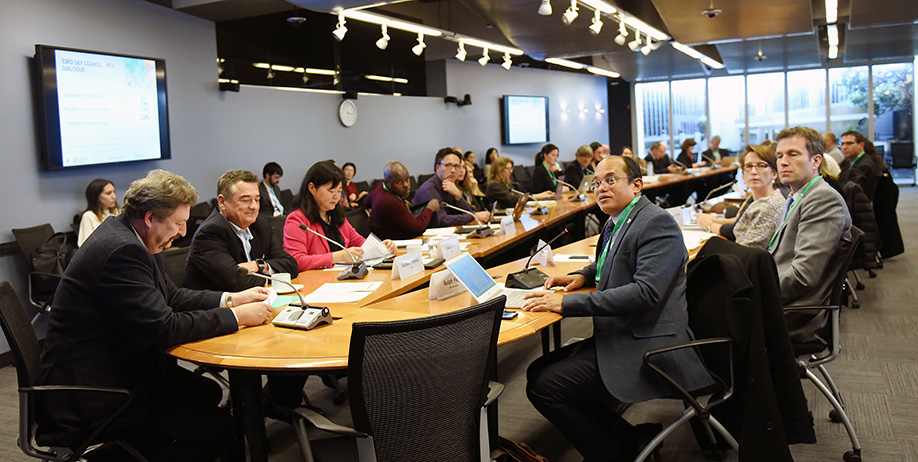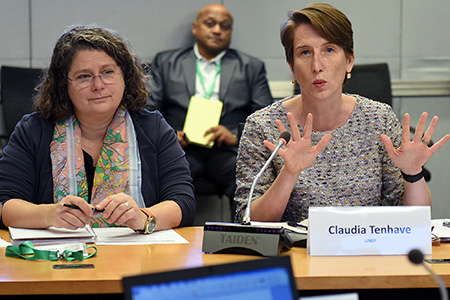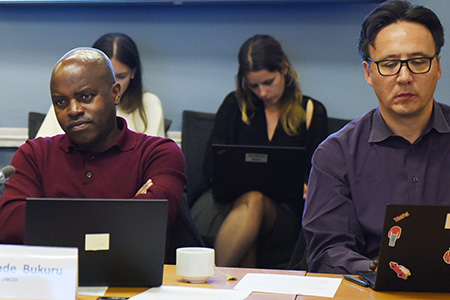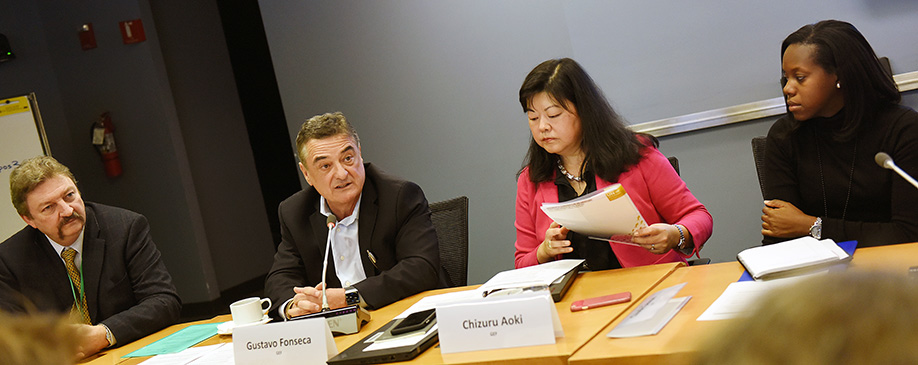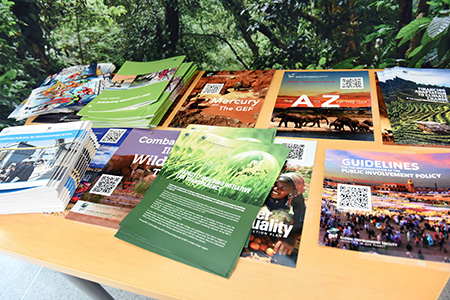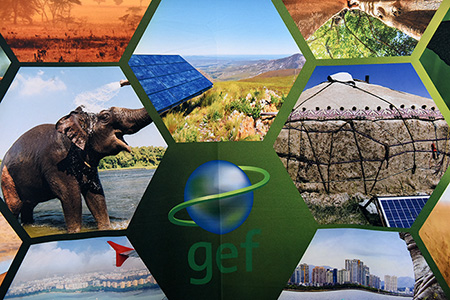Global Environment Facility (GEF) Council Consultation Meeting with Civil Society Organizations (CSOs), 53rd GEF Council Meeting, and 23rd Meeting of the Council for the Least Developed Countries Fund (LDCF) and Special Climate Change Fund (SCCF)
27-30 November 2017 | Washington, DC, US
Summary Highlights
|
Highlights for Thursday, 30 NovemberOn the third and final day of the 53rd meeting of the GEF Council, Council members concluded their discussion on the “Updated Vision to Enhance Civil Society Engagement with the GEF” and decided to leave the responsibility of selecting sponsored CSO representatives with the Secretariat rather than using a third party. Members also convened the 23rd meeting of the LDCF/SCCF Council, with Naoko Ishii, GEF CEO and Chairperson, acting as Chairperson of the LDCF/SCCF Council, recalling recent announcements of contributions to the funds. Council members discussed predictability of the Funds and reaffirmed contributions made at COP23 from: Germany (€50 million); Belgium (€7 million); Sweden (SEK185 million); Switzerland (CHF1.89 million to the LDCF and CHF500,000 to the SCCF); and the Walloon region of Belgium (€3.25 million). Contributions to the Adaptation Fund were also acknowledged. On an agenda item on the “Strategic Alignment of the LDCF Pipeline,” Council members considered an information document that presents factors and options for the strategic and innovative use of resources of LDCF and SCCF and provides an update on the current status of the pipeline. The Secretariat indicated it will develop a new Climate Change Adaptation Strategy and requested informal consultations with members, CSOs, the private sector, and key stakeholders on items addressed in the note and in moving forward. At the end of the Thursday morning session, Council members adopted both the Joint Summaries of the Chairs for the 53rd meeting of the GEF Council and the 23rd meeting of the LDCF/SCCF Council. Ishii congratulated Council members for their contributions and collaboration and noted that the unexpected challenges of the meeting proved the Council has built sufficient trust to tackle difficult issues. Ishii closed the meeting at 12:57 pm. See full web coverage for Thursday, 30 November |
||
|
IISD Reporting Services, through its ENB+ Meeting Coverage, has provided daily web coverage and a summary report from the GEF Council Consultation Meeting with CSOs, the 53rd GEF Council Meeting, and the 23rd Meeting of the LDCF/SCCF Council. The summary report is now available in HTML and PDF. Photos by IISD/ENB | Leila Mead | ||
|
|
|
||
|
|
|
|
Wednesday, 29 November
On Wednesday, 29 November 2017, the GEF Council considered the proposed November 2017 Work Program, which includes: 83 full-sized projects; one programmatic approach; 101 recipient countries; 38 least developed countries (LDCs) and 28 Small Island Developing States (SIDS); and US$2.6 billion in co-financing. The GEF Secretariat reported that 76% of total original GEF-6 resources, 94% of revised GEF-6 resources, 92% of LDCs/SIDS allocations, and 82% of STAR Adjusted allocations for all other countries have been programmed. During discussion, Council members supported elements of the Work Program and commended the Secretariat’s efforts in balancing geographical and focal area distribution of the projects. Noting that three of 18 entities, namely, the UN Development Programme (UNDP), UN Environment Programme (UNEP) and World Bank, were allocated over 60% of programming, many Council members called for balanced inclusion of all Accredited Entities. Council members also discussed the level of private sector co-financing, enhancing cooperation with multilateral development banks (MDBs), and increasing investment in the work of the GEF. At the conclusion of the discussion, the Council approved the Work Program, subject to the comments made during the Council meeting and pending further submissions by Constituencies. Additional agenda items discussed on the second day of the three-day Council meeting included: Rationale and Plan to Review GEF's Fiduciary Standards; Updated Policy on Ethics and Conflict of Interest for Council Members, Alternates, and Advisers; Relations with the Conventions and Other International Institutions; Non-Grant Instruments: Experience of the GEF Partnership; Plan to Review GEF’s Social and Environmental Safeguards; and the CEO Report on the Status of GEF-7 Replenishment. The GEF Council also held a dialogue with the heads of the Secretariats of the Stockholm Convention on Persistent Organic Pollutants (POPs) and the Minamata Convention on Mercury. See the full web coverage for Wednesday, 29 November |
||
|
||
|
|
|
|
|
|
|
|
|
|
|
Rolph Payet, Executive Secretary of the Basel, Rotterdam and Stockholm (BRS) Conventions |
||
|
|
|
Tuesday, 28 November
On Tuesday, 28 November 2017, Naoko Ishii, Chief Executive Officer (CEO) and Chairperson of the Global Environment Facility (GEF), opened the 53rd meeting of the GEF Council, asking members to focus this meeting on: lessons learned from integrated and more complex approaches; private sector engagement; policy work related to gender, stakeholder engagement, safeguards, fiduciary standards, and knowledge management; the institutional framework related to transparency and civil society; and the Work Program. Highlighting ecosystems and natural resources as solution providers, she cited successful project examples that change the narrative from “victim of climate change to stewardship of nature as a solution.” Jane Chigiyal, Federated States of Micronesia (Council member for Cook Islands, Fiji, Indonesia, Kiribati, Marshall Islands, Federated States of Micronesia, Nauru, Niue, Palau, Papua New Guinea, Philippines, Samoa, Solomon Islands, Timor Leste, Tonga, Tuvalu, and Vanuatu) was elected Co-Chair for the 53rd meeting of the GEF Council. The Council proceeded to adopt the Policy on Gender Equality, which will come into effect on 1 July 2018, and will be applied to all new GEF-financed activities submitted on or after the effective date. The Council also adopted a new Policy on Stakeholder Engagement, for which guidelines will be developed through a consultative process that will seek to harmonize existing best practices. Following a brief update on the organization of the 6th GEF Assembly, the Council agreed that the Assembly would convene in Da Nang, Viet Nam, from 27-28 June 2018, with the 54th meeting of the GEF Council convening from 24-26 June, along with a CSO Forum on 26 June and side events. Additional agenda items discussed on Tuesday were the Report of the Chairperson of the Scientific and Technical Advisory Panel, the Updated Vision to Enhance Civil Society Engagement with the GEF, and the Semi-Annual Evaluation Report November 2017 and Management Response + OPS6 Presentation. See the full web coverage for Tuesday, 28 November |
||
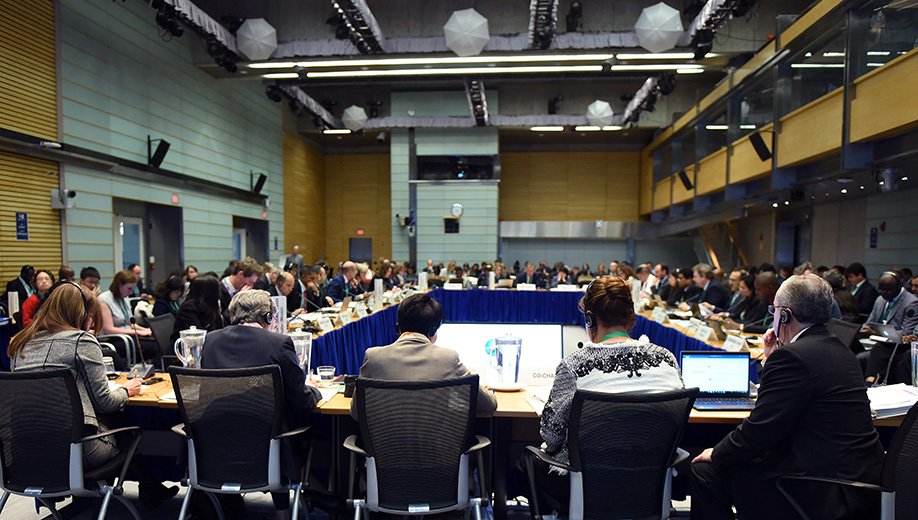
A view of the room during the session |
||
|
|
|
|
|
|
|
A photo of a seahorse swimming with a discarded cotton swab to illustrate the problem of plastics and pollution in the ocean during the presentation of the STAP Chair |
||
|
Naoko Ishii, GEF CEO and Chairperson, and William Ehlers, GEF Secretariat, consult with Council member Stefan Schwager, Switzerland, Peter Wisner, Ad Hoc Council Working Group Chair on the GEF and Civil Society, and Council member Aparna Subramani, India |
||
|
Monday, 27 November
Representatives from civil society organizations (CSOs) and members of the GEF Council convened on Monday, 27 November 2017, at the World Bank headquarters in Washington, DC, for a dialogue on issues related to the 53rd meeting of the GEF Council. The consultation took place the day before the Council meeting opened. Victor Kawanga, GEF-CSO Network Chair, opened the Consultation and introduced Akhteruzzaman Sano, GEF-CSO Network Vice Chair, who provided an overview of Network activities, including a session on knowledge management, national and regional level engagement, and strengthening indigenous peoples’ contributions at the local level. During a dialogue with the GEF CEO and Chairperson, Naoko Ishii highlighted engagement by the GEF at recent Conferences of the Parties (COPs) to the UNCCD, Minamata Convention on Mercury, and UN Framework Convention on Climate Change (UNFCCC). She highlighted the launch of the Land Degradation Neutrality Fund (LDN Fund) at the UNCCD COP, noting that it provides an effective way forward for the GEF to integrate land, soil, and forests in its activities. On UNFCCC COP 23, she reflected on the increased effectiveness of coalitions at the subnational level among diverse stakeholders. On the way forward, she noted the need to strengthen: integration at all levels; private sector and multi-coalition platforms; gender policy; stakeholder engagement; and an updated CSO vision. CSO representatives then exchanged views on: strengthening the role and support for CSOs in the work of the GEF; the format of the upcoming GEF Assembly; elements for consideration in Operational Programme 7 (OP7); and guidance on engagement of the private sector. A subsequent panel discussed the findings from the sixth comprehensive evaluation of the GEF (OPS6) and heard an update on the seventh replenishment process (GEF-7). Juha Uitto, GEF Independent Evaluation Office (IEO), presented findings from OPS6. Gustavo Fonseca, GEF Secretariat, noted that two GEF-7 meetings have taken place to receive input on proposals for programming during the next replenishment period. He said three impact programs are under consideration, namely: land use, food systems and restoration; sustainable cities; and sustainable forest management. During a session on further GEF engagement with CSOs, Peter Wisner, Chair, Ad Hoc Council Working Group on GEF and Civil Society, presented the Updated Vision, emphasizing the need to strengthen CSO engagement at all stages of the GEF processes, from project design to implementation. He highlighted key recommendations, including: selection process and criteria for CSO representation at Council meetings, which may consider experience and continuity of representatives; structure of CSO meetings to be focused on topics that could be used to inform Council proceedings; and the inclusion of CSO interventions during Council meetings rather than at the end of each session. Another panel discussed updated GEF policies, focusing on gender equality and stakeholder engagement in GEF projects and processes. Anna Viggh, GEF IEO, highlighted that the portion of gender-blind projects has decreased while gender-aware projects are increasing. She said the 2011 gender policy has improved gender considerations in GEF operations, but lacks a clear framework. Describing the updated gender policy, Gabriella Richardson Temm, GEF Secretariat, explained how the new framework will shift from “do no harm” to “do good,” establishing stronger gender analysis and reporting requirements, among others. Pilar Barrera, GEF Secretariat, presented an updated stakeholder engagement policy up for approval at this Council meeting, to take effect July 2018. Nguavese Tracy Ogbonna, GEF-CSO Network (Gender), recommended strengthening gender participation, through: including CSOs in all processes of the project and program cycle; integrating gender in monitoring, learning and capacity development; and enhancing agency policies, procedures and capabilities and compliance to reflect gender. See the full web coverage for Monday, 27 November |
||
|
|
|
|
|
|
|
|
|
|
A view of the dais during a discussion on gender equality and stakeholder engagement in GEF projects and policies (L-R): Pilar Barrera, GEF Secretariat; Anna Viggh, GEF IEO, making her presentation; Co-Moderator Mrinalini Rai, Global Forest Coalition; Gabriella Richardson, GEF Secretariat; and Co-Moderator Bertrand Bhikarry, RFP for the Caribbean |
||
|
|
|
A view of the room during the dialogue with MEA Secretariats and the GEF during the presentation of Rolph Payet, Executive Secretary, BRS Secretariat (right) |
||
|
|
|
Jozef Buys, GEF Council memeber, Belgium, Gustavo Fonseca, GEF Secretariat, and Chizuru Aoki, GEF Secretariat |
||
|
|
and 23nd Meeting of the LDCF/SCCF Council has been provided by the GEF Secretariat


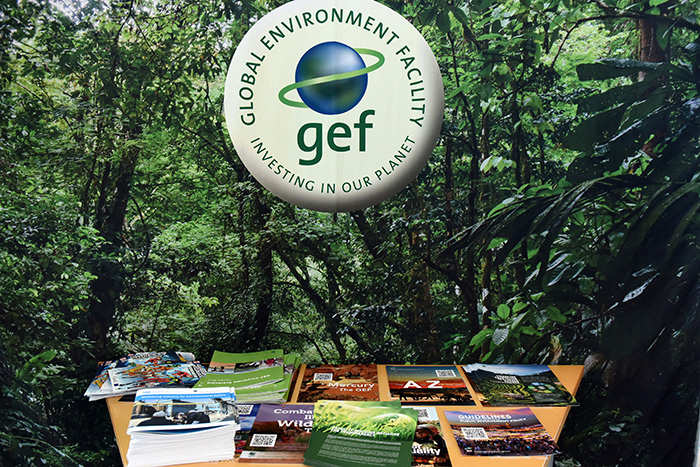
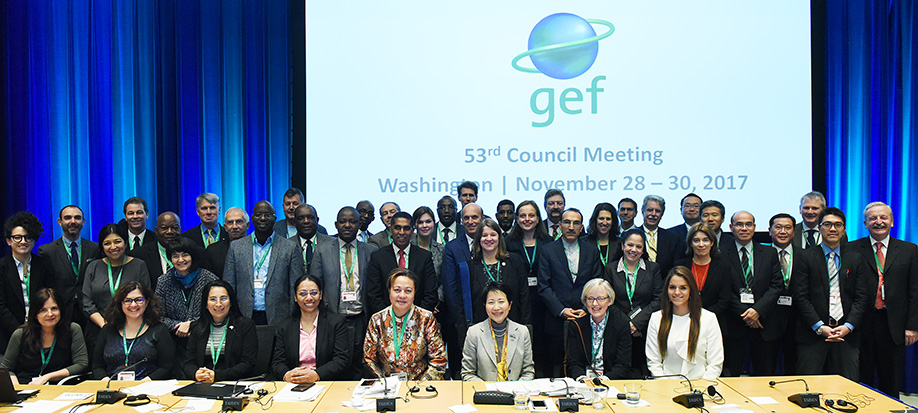
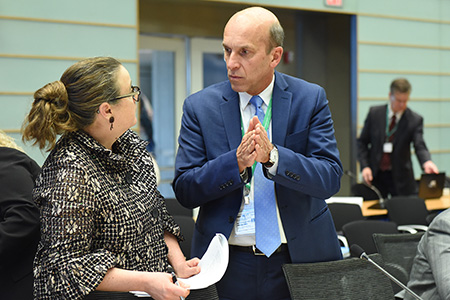 Maria Dakolias, Lead Counsel, World Bank Legal Vice Presidency, and Council member Stefan Schwager, Switzerland
Maria Dakolias, Lead Counsel, World Bank Legal Vice Presidency, and Council member Stefan Schwager, Switzerland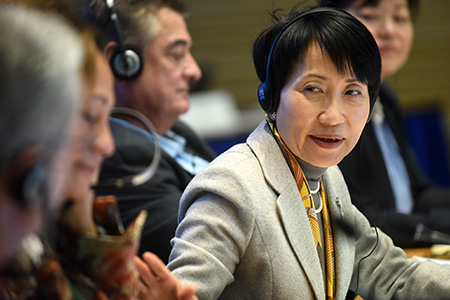
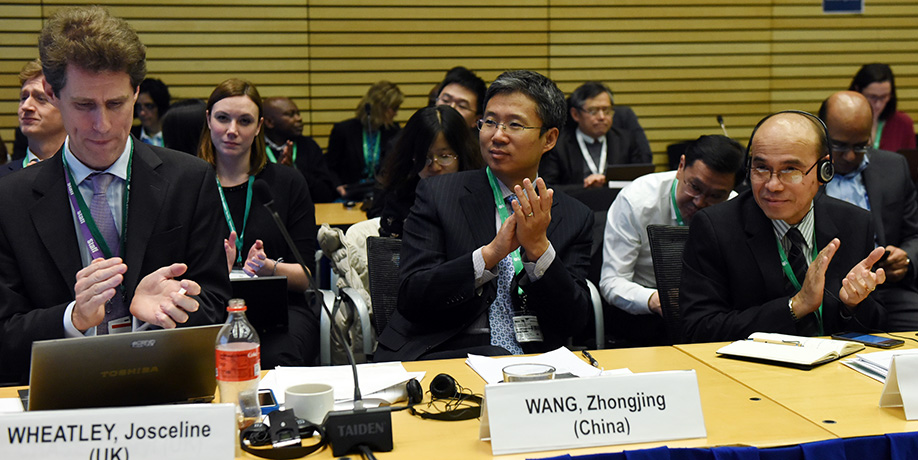
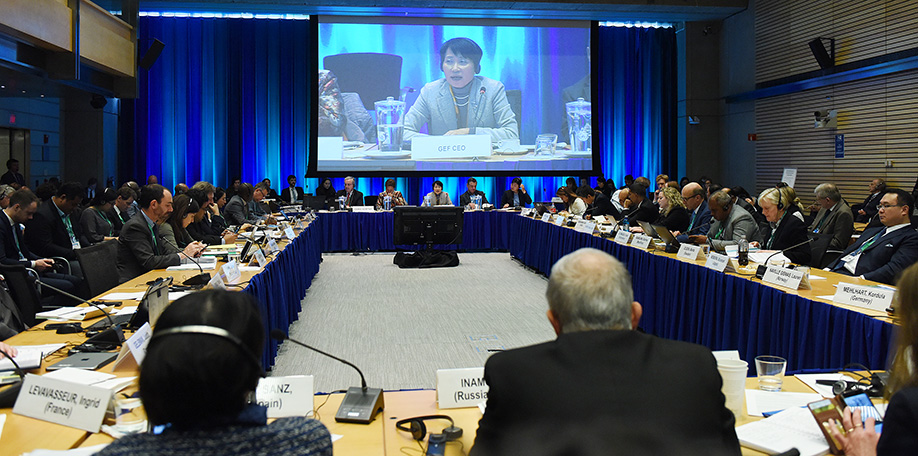
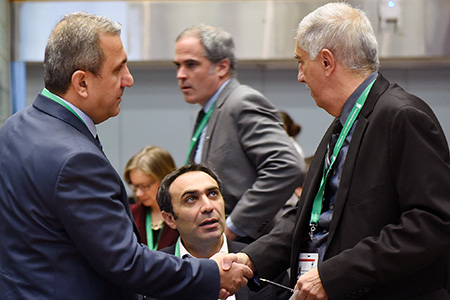 Council Co-Chair Jane Chigiyal, Federated States of Micronesia, and Naoko Ishii, GEF CEO and Chairperson
Council Co-Chair Jane Chigiyal, Federated States of Micronesia, and Naoko Ishii, GEF CEO and Chairperson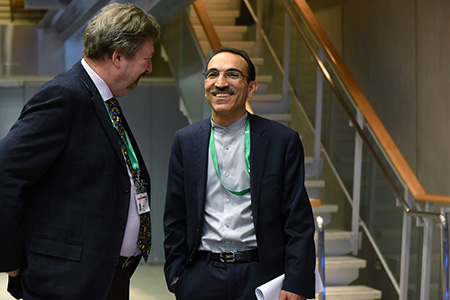
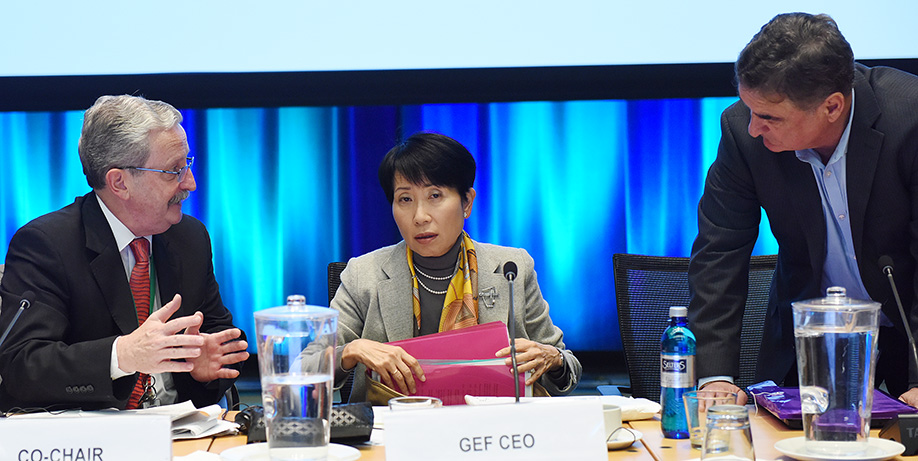


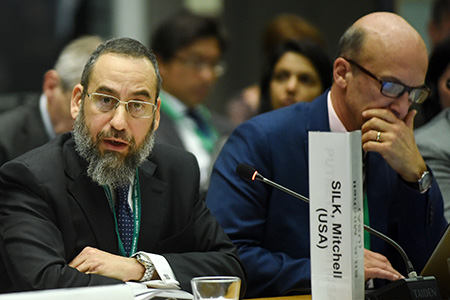
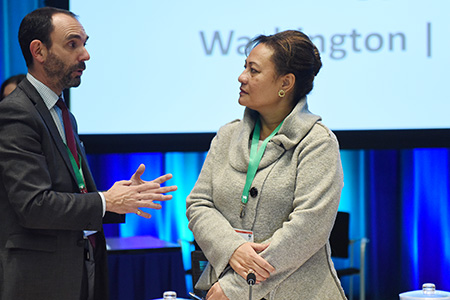
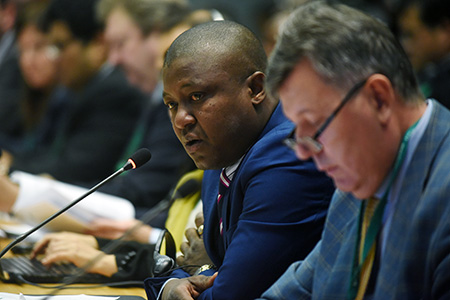
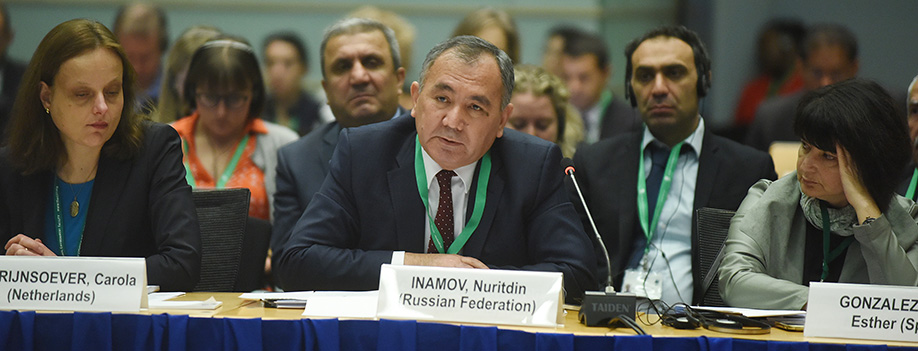
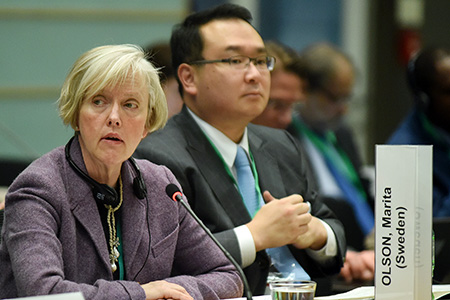
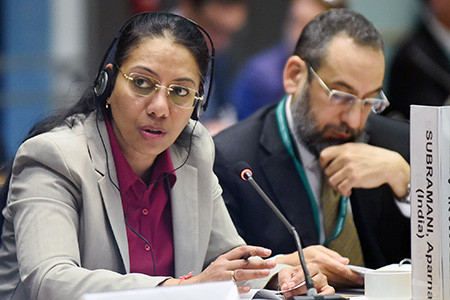
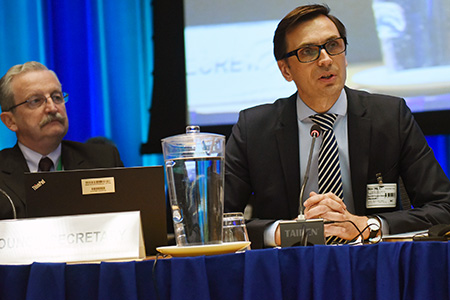 Jacob Duer, Principal Coordinator of the Interim Secretariat of the Minimata Convention
Jacob Duer, Principal Coordinator of the Interim Secretariat of the Minimata Convention  Rolph Payet, Executive Secretary of the Basel, Rotterdam and Stockholm (BRS) Conventions
Rolph Payet, Executive Secretary of the Basel, Rotterdam and Stockholm (BRS) Conventions 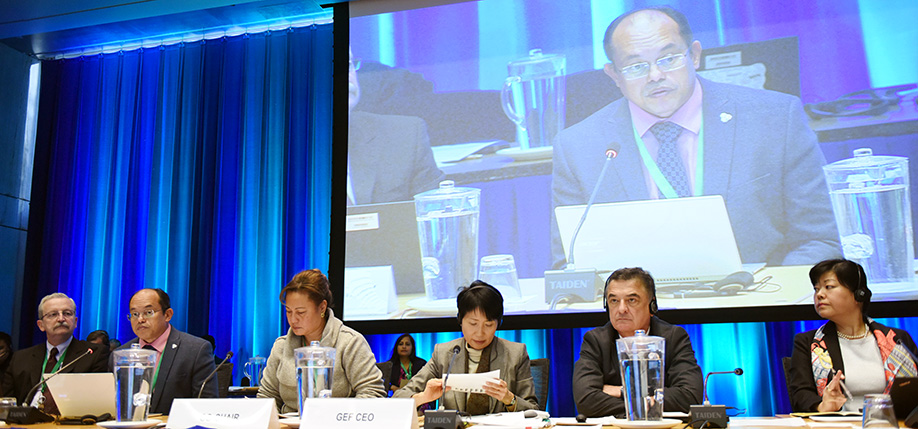
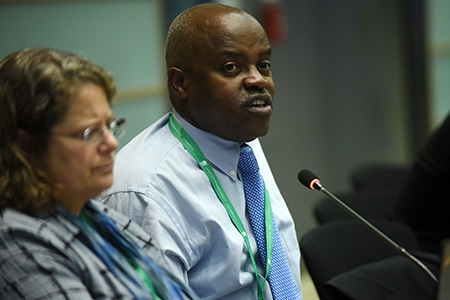 Melchiade Bukuru, Chief of UN Convention to Combat Desertification (CCD) Liaison Office
Melchiade Bukuru, Chief of UN Convention to Combat Desertification (CCD) Liaison Office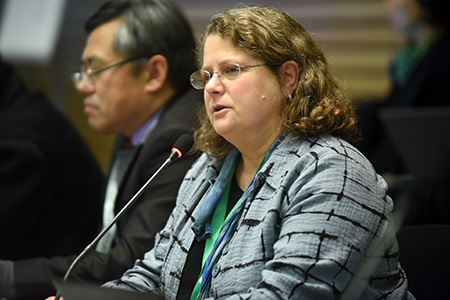 Amy Fraenkel, Director, Mainstreaming, Cooperation and Outreach Division, Convention on Biological Diversity (CBD) Secretariat
Amy Fraenkel, Director, Mainstreaming, Cooperation and Outreach Division, Convention on Biological Diversity (CBD) Secretariat